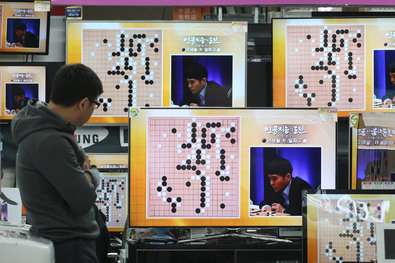
Does AlphaGo Mean Artificial Intelligence Is the Real Deal?
The ancient board game Go long remained a human conquest — requiring too much complex strategy and intuition to be bested by a computer. But in a major breakthrough for artificial intelligence, a Google computer program called AlphaGo beat the world champion, South Korea’s Lee Se-dol, on Tuesday night in the first of five matches. Does this mean computers are gaining the upper hand on humans?
* real deal = 진정한, 가치 있는 것/ ancient = 고대의/ conquest = (힘든 일의) 정복[극복]; 점령지/ intuition = 직관력, 직감, 직관/ best = …을 이기다, …보다 잘 하다/ breakthrough = 돌파구/ gain the upper hand on(over) ~ = …에게 이기다, …보다 우세하게 되다
 바둑 시합에서 AlphaGo의 승리는 인공 지능 기능을 갖춘 컴퓨터가 인간보다 우세함을 의미하나요?
바둑 시합에서 AlphaGo의 승리는 인공 지능 기능을 갖춘 컴퓨터가 인간보다 우세함을 의미하나요?
1. The Human Advantage Is Eroding Fast
The mere fact that a machine can learn and strategize is a testament to the future of artificial intelligence beyond the realm of a human mind.
2. The Skills of Human Interaction Will Become Most Valuable
Advancing technology will profoundly change the nature of high-value human skills, but we aren't doomed.
3. AlphaGo Will Enable Us To Enhance Human Capabilities
Some of the technology behind AlphaGo is already helping amputees control prosthetic devices, and robots interact with people.
4. This Artificial Intelligence Can Only Be Extrapolated So Far
There is no real-world cost to a machine losing a game as its software learns to improve, but decisions about real people have real ramifications.
Sample Essay
The Skills of Human Interaction Will Become Most Valuable in the Future
AlphaGo’s victory over Go champion Lee Se-dol reportedly shocked artificial intelligence experts, who thought such an event was 10 to 15 years away. But if the timing was a surprise, the outcome was not. On the contrary, it was inevitable and entirely foreseeable.
Playing complex games, even the most complex game ever invented, is precisely what computers do supremely well. Just as they beat the world champions at checkers and then chess, they were destined to beat the champion at Go. It’s a game of clear rules, and while winning required new forms of computing that rely on a computer that can learn from experience, a machine will eventually best all humans at tasks of this kind.
Yet I don’t believe, as some do, that human defeats like this one presage an era of mass unemployment in which awesomely able computers leave most of us with nothing to do. Advancing technology will profoundly change the nature of high-value human skills and that is threatening, but we aren't doomed.
The skills of deep human interaction, the abilities to manage the exchanges that occur only between people, will only become more valuable. Three of these skills stand out: The first, the foundation of the rest, is empathy, which is more than just feeling someone else’s pain. It’s the ability to discern what another person is thinking or feeling, whatever it may be, and to respond in an appropriate way.
The second is creative problem solving in groups. Research on group effectiveness shows that the key isn't team cohesion or motivation or even the smartest member’s IQ; rather, it’s the social sensitivity of the members, their ability to read one another and keep anyone from dominating.
The third critical ability, somewhat surprisingly, is storytelling, which has not traditionally been valued by organizations. Charts, graphs and data analysis will continue to be important, but that’s exactly what technology does so well. To change people’s minds or inspire them to act, tell them a story.
These skills, though basic to our humanity, are fundamentally different from the skills that have been the basis of economic progress for most of human history: Logic, knowledge and analysis, which we learned from textbooks and in classrooms, are now skills being commoditized by advancing technology. By contrast, the skills of deep human interaction address the often irrational reality of how human beings behave, and we find them not in textbooks but inside ourselves. As computers master ever more complexity, that’s where we’ll find the source of our continued value.





![]() 바둑 시합에서 AlphaGo의 승리는 인공 지능 기능을 갖춘 컴퓨터가 인간보다 우세함을 의미하나요?
바둑 시합에서 AlphaGo의 승리는 인공 지능 기능을 갖춘 컴퓨터가 인간보다 우세함을 의미하나요?






